Earlier this week I listened to Dr Dinesh Palipana OAM share some of the story that brought him as a healthy child from struggling Sri Lanka to a life in Australia where, as a quadriplegic doctor, he is currently Queensland Australian of the Year.
His tenacity, drive and humility to become a founder of Doctors with Disabilities Australia is a story for another day. What I want to share now is a how he came to be a doctor.
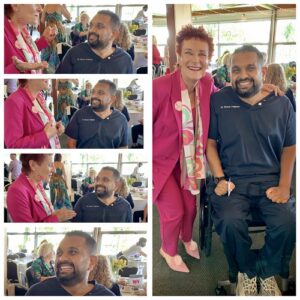 Dr Palipana first thought he’d be a lawyer, and became one, but in the process experienced clinical depression. His recovery led him on a journey to then study medicine so he could help others as he had been helped. During the next degree he had a catastrophic car accident on Brisbane’s Gateway Motorway that impacted everything but not his drive to become a doctor.
Dr Palipana first thought he’d be a lawyer, and became one, but in the process experienced clinical depression. His recovery led him on a journey to then study medicine so he could help others as he had been helped. During the next degree he had a catastrophic car accident on Brisbane’s Gateway Motorway that impacted everything but not his drive to become a doctor.
He fought Queensland Health to become our first doctor in a wheelchair and is also a lecturer and adjunct research fellow at Griffith University with a special interest in spinal cord injury and rehabilitation.
During his presentation he said “It’s more difficult to be a prisoner of our mind than a prisoner of our body”. And, of course, he has experienced both. Think about that…
“It’s more difficult to be a prisoner of our mind than a prisoner of our body”
When did you last check in on your mental health?
This month in Australia is National Mental Health Month. And in Queensland and WA it’s Mental Health Week.
They all have their promoted themes from “Resilience and Recovery” to “Take Time for Mental Health”.
So what exactly is mental health?
According to Mental Health Australia “Good mental health is when we can cope with the stressors of our daily lives, participate in loving relationships, contribute to our community, and work towards our goals. Everyone has mental health. And we can all benefit from looking after our own mental health and the mental health of our communities.”
Thank goodness we can talk about this now because it wasn’t very long ago that we thought we couldn’t and so didn’t. And we certainly didn’t talk about the flipside – mental illness – a couple of decades ago when I had a debilitating crisis of which even my parents were blissfully unaware. It felt taboo. Embarrassing. The stuff of secrets unlike broken bones and heart attacks and measles and strokes, which are discussed openly, mostly.
We need to talk about mental illness more as the widely held statistic is that it affects 1 in 5 of us worldwide. Some countries like the United States and The Netherlands report a higher number and others like Italy and much of Asia report lower numbers.
The official number reported by the Australian Bureau of Statistics is still 20% but sadly when I hear psychologists speak before or after me as part of my volunteer role as an R U OK? Day Community Ambassador, their feeling is a number more like 1 in 3 to 4 people than 1 in 5.
Movies starting conversations
Over the years, some high profile movies have highlighted a range of mental disorders. For example:
- Schizophrenia: A Beautiful Mind
- Autism: Rain Man
- Obsessive Compulsive Disorder (OCD): As Good As It Gets
- Bipolar Disorder: Silver Linings Playbook
- Various in a mental hospital: One Flew Over The Cuckoo’s Nest
These movies go some way to opening up conversations in the community. When done well they can serve to educate. Not everyone agrees that these listed are necessarily good examples of the illnesses though.
Full Circle doing its job
Sometimes we’re not feeling quite right, or even having a crisis, and we’re unaware how to label it. Even though we weren’t looking explicitly, we might find clues in the pages of a book we read for another reason.
A few years ago I published a book about my experience with post-traumatic stress disorder (PTSD): Full Circle – Building Resilience in Business and Life from the Jagged Edges of PTSD. 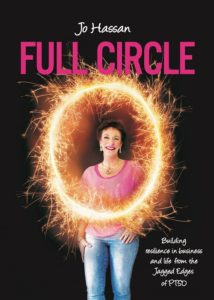
It is the back story on the back story for why I now rigorously promote the virtues of living business and life through a lens of vitality for the sake of our mental health as well as increased profits in our businesses.
The book is available for purchase from my website and online stores the world over. Many clients read it as a prelude to working with me. They might be looking for business coaching, a conference presentation (in person or online) or be an individual looking for more vitality.
I’ve lost track of the number of times people have contacted me and said they’ve seen themselves in my story in some way. What has happened on several occasions though is people have actually sought professional medical help after recognising some of my described symptoms.
On one occasion I actually gave someone a refund after they’d paid the deposit for a coaching program because they knew they needed to support themselves with psychological help before they received help with their business.
And it happened again just a fortnight ago… someone needing time and some sessions with a psychologist before starting work with me.
I’m very clear that I’m not a medical professional, but an empath with lived experience of mental illness. Some people find that comforting.
Mental Health Themes
There are connections between the themes “Resilience and Recovery” and “Take Time for Mental Health”. For me both tie in with taking care of vitality or my word for it – PEPP®. PEPP® means living business and life through a lens of:
- Purpose
- Energy
- Pleasure
- Profit
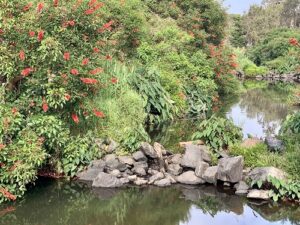 If we check in regularly with each of these elements then it’s my experience, and the experience of those I work with that life improves. As previously mentioned, I’m not a medical professional but a client who has completed my PEPP® Express Program stated their vitality has gone from -25% where it previously sat for 7 year to 50%. That is a monumental improvement… life-changing.
If we check in regularly with each of these elements then it’s my experience, and the experience of those I work with that life improves. As previously mentioned, I’m not a medical professional but a client who has completed my PEPP® Express Program stated their vitality has gone from -25% where it previously sat for 7 year to 50%. That is a monumental improvement… life-changing.
What can you do to look after your mental health? It might be to look at something like the PEPP® Express Program or it might be committing to going for a 30 or 20 or even 10 minute walk every day for both exercise and to be amongst nature.
What can you do so that working on your mental health seems brighter and more positive than this drab sign on the left that I photographed at a hospital? So that doing something – however small – is better than sitting still on your hands or being “a prisoner of your mind”.
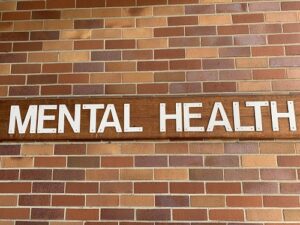
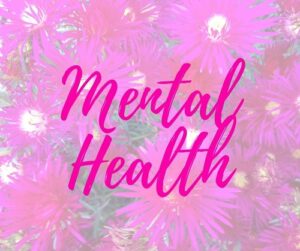
Dr Palipana stated that it is a massive privilege to help people when their life is out of control. If you think I might be able to help, let’s have a conversation.

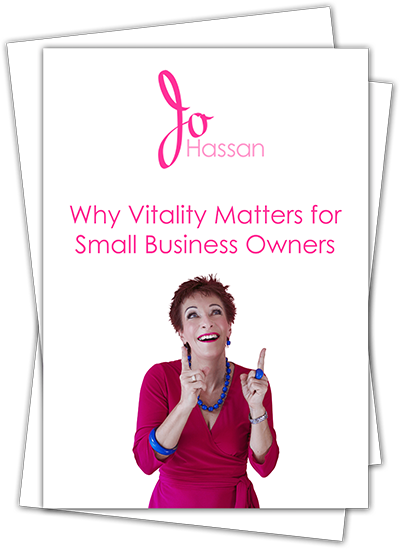
Leave A Comment